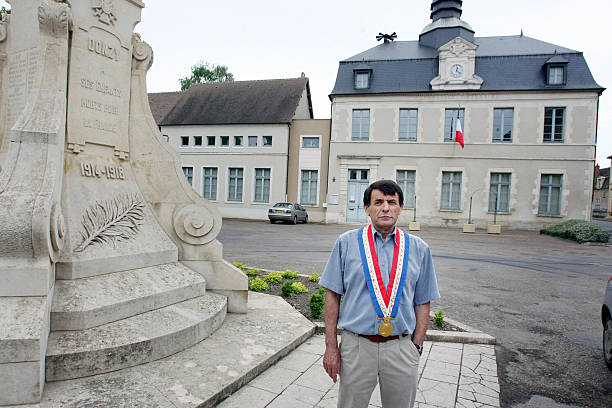The mayor of a French village
The mayor of a country village has a great deal of importance. In our case the mayor represents only 80 people, but he has to go to meetings that in theory conduct decision-making over the villages, village organisations, the departments, the regions, and ultimately, the state. The mayor is a small cog in a big machine, but he does have a voice. He is an elected officer of the village. In the village itself, nothing can be done without him. He is also a political figure. Because he is paid by the state, he carries out the orders of the President. But it doesn't mean he agrees with what the President tells him to do.

Many of my ideas come from other people - reading, and talking. I stumbled on an interesting website that represents every mayor in rural France - the amrf. I can't give you the link because the website is unsecured, but anybody can access it.
I was pleasantly surprised how well-written the piece was. The original version was in French, so I give you here my version of it.
Stop, ou encore?
"Are we going to stop here, or recommit the same mistakes again?
We've just come through 60 years of the promotion of ever more concentrated urban living, believing that such a move is 'healthy development'. This is just a myth. It has lead to imbalance when you view the country as a whole, but in particular the rural areas have lost their ability to accommodate people in a progressive way. Our politicians are essentially city-based people, surrounded by state employees, who we like to call technocrats. Technocrats is a sexy-sounding word, but in this context is used quite maliciously, indicating administrators who operate behind a mask of technicity, of progress, simply because they are representing this urban proletariat.
I like the idea of a blinkered horse, blinkered to stop him being frightened by his all round vision of his environment. This blinkered vision is what we people are experiencing. The place of our rural areas must be reconsidered. Our political geography must be rebalanced. Our institutions must be redrawn. We have had recent governments that have found themselves speech-making in the countryside, but they have used that popular French word, "equality" in a loose sense. It seems like the city dwellers promote the idea of equality, but in fact they have no idea what exactly constitutes equality. Various recently-passed laws have directly or indirectly deepened inequality, so now what we need to see is more cohesion from the rural community itself to make sure that this doesn't continue.
This new rural cohesion should base itself around some fundamentals: -
. a new definition of "French territory" that respects the needs of rural dwellers to have the same rights and access as urban dwellers
.a new definition of ""space", that shows how a spacious rural living area is a viable alternative
. a new assessment of the effects of higher or lower population density, and the services and systems that need to be accorded to each
. a new recognition of the real rights of rural dwellers, to not only be allowed to live in rural zones, but for their voices to be heard, and for laws to be drawn up considering their needs too.
This new cohesion will be credible, and will lead to a real investment.
The AMRF is a regrouping of rural mayors in France who have always campaigned for their corner. In presidential elections, they have been represented by candidates and by policies.
Macron in uniform

But let us now look at one year of living under Macron. It doesn't make pretty reading.
The Macron cuts, and redistribution of state monies, have led to a marked weakening of rural communities, both financially and politically. Macron has tried to mask his cuts, by seemingly being generous in other areas, but this is a dirty trick.
His has been a communications exercise too, with blatant dishonesty, and hindering the expression of other opinions, and worse, over-riding the rights of elected officers to represent their regions and communities.
The competences of local officers, even important knowledge such as over water supplies and water treatment, is being ignored. The mayors are seeing their influence areas being encroached on by decision-makers from the towns, including the traffic police, now an urban organisation with no idea how the countryside works.
The role of a mayor
This is so mad. The new world we are being forced to live in certainly recognises the customs and ways of rural life, but this new world is trying to rid itself of this old world. It's not going well, because the rural communities are unhappy. The State is in charge of all of this madness. The State is ostensibly trying to write their own page of history, and imprint itself on the minds of its citizens. These new rules have accelerated a decline that has been going on for 60 years. These new rules don't look at the reality of today, nor the obligations we have in the future, such as climate change, nor addressing the rural/urban infrastructure imbalance, nor more profoundly finding a stronger social cohesion, and a real concept of society. There are real visible fractures in our society that are being ignored, and cannot be ignored any longer. It is time to act."
.
with many thanks to
VANIK BERBERIAN
Président AMRF

